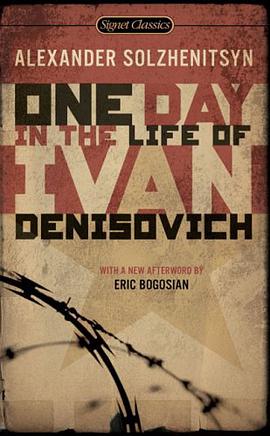One Day in the Life of Ivan Denisovich 豆瓣
作者:
Alexander Solzhenitsyn
译者:
Ralph Parker
Signet Classics
2008
- 8
Ivan Denisovich Shukhov has been sentenced to a camp in the Soviet gulag system. He was accused of becoming a spy after being captured briefly by the Germans as a prisoner of war during World War II. He is innocent, but is sentenced to ten years in a forced labor camp.
The day begins with Shukhov waking up sick. For waking late, he is forced to clean the guardhouse, but this is a comparatively minor punishment. When Shukhov is finally able to leave the guardhouse, he goes to the dispensary to report his illness. It is relatively late in the morning by this time, however, so the orderly is unable to exempt any more workers and Shukhov must work.
The rest of the novel deals mainly with Shukhov's squad (the 104th, which has 24 members), their allegiance to the squad leader, and the work that the prisoners (zeks) do in hopes of getting extra food for their performance. For example, they are seen working at a brutal construction site where the cold freezes the mortar used for bricklaying if not applied quickly enough. Solzhenitsyn also details the methods used by the prisoners to survive; the whole camp lives by the rule of survival of the fittest.
Tiurin, the foreman of gang 104, is strict but kind, and the squad's fondness of Tiurin becomes more evident as the book progresses. Though a morose man, Tiurin is liked because he understands the prisoners, he talks to them, and he helps them. Shukhov is one of the hardest workers in the squad and is generally well-respected. Rations are meagre at the camp, but they are one of the few things that Shukhov lives for. He conserves the food that he receives and is always watchful for any item that he can hide and trade for food at a later date.
At the end of the day, Shukhov is able to provide a few special services for Tsezar (Caesar), an intellectual who does office work instead of manual labor. Tsezar is most notable, however, for receiving packages of food from his family. Shukhov is able to get a small share of Tsezar's packages by standing in lines for him. Shukhov reflects on his day, which was both productive and fortuitous for him.
The day begins with Shukhov waking up sick. For waking late, he is forced to clean the guardhouse, but this is a comparatively minor punishment. When Shukhov is finally able to leave the guardhouse, he goes to the dispensary to report his illness. It is relatively late in the morning by this time, however, so the orderly is unable to exempt any more workers and Shukhov must work.
The rest of the novel deals mainly with Shukhov's squad (the 104th, which has 24 members), their allegiance to the squad leader, and the work that the prisoners (zeks) do in hopes of getting extra food for their performance. For example, they are seen working at a brutal construction site where the cold freezes the mortar used for bricklaying if not applied quickly enough. Solzhenitsyn also details the methods used by the prisoners to survive; the whole camp lives by the rule of survival of the fittest.
Tiurin, the foreman of gang 104, is strict but kind, and the squad's fondness of Tiurin becomes more evident as the book progresses. Though a morose man, Tiurin is liked because he understands the prisoners, he talks to them, and he helps them. Shukhov is one of the hardest workers in the squad and is generally well-respected. Rations are meagre at the camp, but they are one of the few things that Shukhov lives for. He conserves the food that he receives and is always watchful for any item that he can hide and trade for food at a later date.
At the end of the day, Shukhov is able to provide a few special services for Tsezar (Caesar), an intellectual who does office work instead of manual labor. Tsezar is most notable, however, for receiving packages of food from his family. Shukhov is able to get a small share of Tsezar's packages by standing in lines for him. Shukhov reflects on his day, which was both productive and fortuitous for him.

